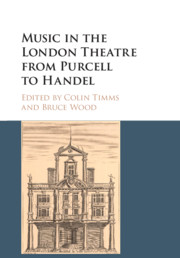Book contents
- Frontmatter
- Contents
- List of Figures
- List of Music Examples
- Notes on Contributors
- Preface
- Introduction
- I FROM PURCELL TO HANDEL
- 1 Purcell's ‘Scurvy’ Poets
- 2 Opera as Literature and the Triumph of Music
- 3 The British Enchanters and George Granville's Theory of Opera
- 4 Lost Chances: Obstacles to English Opera for Purcell and Handel
- 5 Alexander's Feast, or The Power of Perseverance: Dryden's Plan for English Opera and its Near-fulfilment in a Handel Ode
- II HANDEL AND ITALIAN OPERA
- III HANDEL AND ENGLISH WORKS IN THE THEATRE
- Bibliography
- Index
5 - Alexander's Feast, or The Power of Perseverance: Dryden's Plan for English Opera and its Near-fulfilment in a Handel Ode
from I - FROM PURCELL TO HANDEL
Published online by Cambridge University Press: 10 June 2017
- Frontmatter
- Contents
- List of Figures
- List of Music Examples
- Notes on Contributors
- Preface
- Introduction
- I FROM PURCELL TO HANDEL
- 1 Purcell's ‘Scurvy’ Poets
- 2 Opera as Literature and the Triumph of Music
- 3 The British Enchanters and George Granville's Theory of Opera
- 4 Lost Chances: Obstacles to English Opera for Purcell and Handel
- 5 Alexander's Feast, or The Power of Perseverance: Dryden's Plan for English Opera and its Near-fulfilment in a Handel Ode
- II HANDEL AND ITALIAN OPERA
- III HANDEL AND ENGLISH WORKS IN THE THEATRE
- Bibliography
- Index
Summary
Modern scholarly editions take years to prepare, and long exposure to the source material usually encourages a measure of respect for it. When expert editors deliver withering critical judgment on a major author, something must be very wrong. Albion and Albanius (the only Dryden libretto designed for musical setting all the way through) ‘probably qualifies for last place among the many kinds of writing Dryden composed for public performance … Today, the preface and postscript hold greater interest than the libretto.’ We draw on the preface and postscript in this chapter, but the libretto itself is a more significant piece of writing than the California editors allow, a genre-stretching literary experiment to which Dryden's late-career triumph with Alexander's Feast can be traced back. So, indirectly, can the runaway success of Dryden's posthumous collaboration with Handel via Alexander's Feast.
Seventeenth-century English writers of words for music had a strong instinctive preference for duple-metre lyrics. Instinct could be overruled, of course: most could and did write triple-metre lyrics in addition (lyrical conformity to triple-metre dance-tune templates was readily achieved); but not enough of these were written to meet composers’ needs. Composers developed ways to bend the duple-metre material with which they were superabundantly supplied into fairly convincing triple-metre shape. We have labelled this ‘parametrical’ word-setting: words of one song to the metrical patterns of another. Here is a famous example:
Fairest Isle, all Isles Excelling,
Seat of Pleasures, and of Loves;
Venus here, will chuse her Dwelling,
And forsake her Cyprian Groves.
Though Purcell's setting sounds entirely natural, in fact ‘Fairest Isle’, in triple time, involves a moderately severe parametrical distortion of Dryden's duple metre original. We could have chosen dozens of other examples from the Purcell song repertoire, putting poems by most of the leading poets of the day through this metrical mangle.
Why did the poets not notice a gap in their technical armoury and do something to fill it? Dryden must take much of the blame. A critic and theoretician of enormous influence, his views on the natural capacities of the English language carried great weight.
- Type
- Chapter
- Information
- Music in the London Theatre from Purcell to Handel , pp. 66 - 80Publisher: Cambridge University PressPrint publication year: 2017



